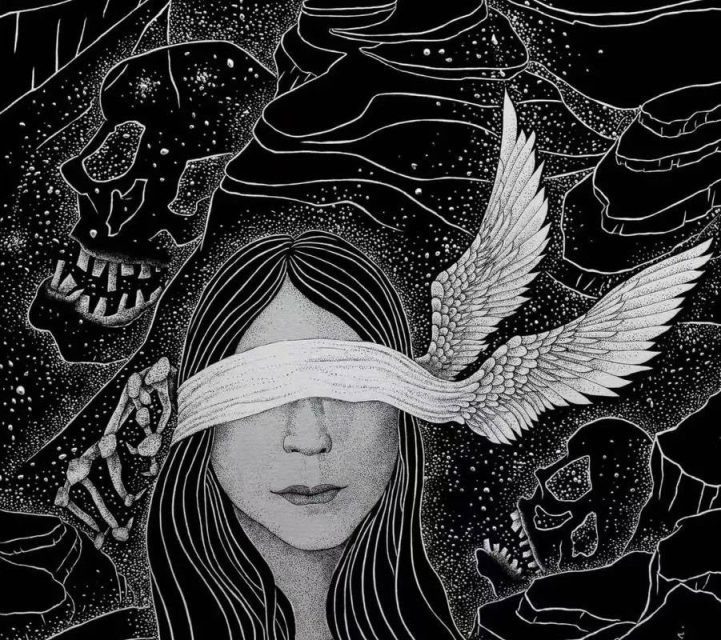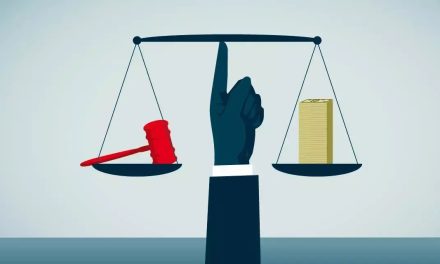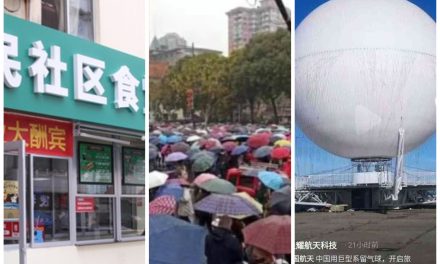By Li Chengpeng (李承鹏)
One morning, Gregor woke up from his sleep to find himself transformed into a giant beetle. He laid on his back against the bed board, looked up, and saw a multitude of legs dancing in front of his eyes. “Oh my God, what’s happened to me?”
One morning, Wang Aiguo woke up from his sleep to find his cellphone displaying a “red alert” – alternatively known as a “red code”. He laid on his back and broke out in a cold sweat, dampening his sheets. Then he looked up and saw many (what appeared to be) cotton swabs dancing in front of his eyes, “Oh my God, what’s happened to me?”
Every Chinese person may encounter an instance of Kafka’s Metamorphosis one morning, suddenly finding themselves no longer a normal human being. They are forbidden from taking the train, banned from accessing healthcare, prohibited from going to work, and barred from owning or operating a business. They find themselves literally sealed shut in a building or even a tiny cabin. The cause could simply be that they passed by a vegetable market or deposited a sum of money in the village bank of Henan, which is about to declare bankruptcy.
Using a “red alert” to restrict citizens’ movements and travel is part of the CCP’s malicious, dystopian “social credit system.” Even worse, well before Wang Aiguo and others began defending their rights, they were hit with “red alert” simply because they professed ideological positions not in line with the malevolent and tyrannical Chinese Communist Party (CCP). The train they had been forced on suddenly come to a standstill. They were violently dragged to the side and banished to a desolate, faraway land. Some people compared the “red alert” to the tattoo on the face of Lin Chong (a fictional character in the classical novel Water Margin). But that’s far too optimistic. After all, in the novel, Lin Chong murdered people. In the new “red alert” decade, much like Tom Cruise’s Minority Report, you are deemed a criminal even when you have the possibility of committing a future crime. This is what George Orwell, in his classic dystopian novel Nineteen Eighty-Four, described as thoughtcrime.
Let’s not pretend to be naïve. From the moment the health code was introduced, it is bound to become a thought code; dystopian thoughtcrime witch-hunting; unprecedented censorship; self-imposed quarantines; and a code that bans open debate and free dialogue. Last year, a “disobedient” lawyer insisted on defending a case in court. Before leaving home, he found that a “red alert” on his mobile phone, prevented him from traveling. This year, a man named Mr. Lin in Fujian Province demanded an explanation. But as soon as he returned on a train, his cellphone displayed a “red alert” turned red, and he was instantly transported back to his home by the relevant authority. The latest news we all know, hundreds of owners in Zhengzhou complained about the late delivery of their properties, that it was a violation of real estate funding rules. When they held discussions to protect their rights together, suddenly they received a “red code.” Only after they wrote a pledge that they would no longer shamelessly defend their rights without reason, and that their thinking had changed, their code turned back to green.
You say, do Chinese people have any sense of security?
In the movie Wolf Warrior, there was a memorable line: “Chinese people have the highest sense of security in the world. Americans simply cannot enjoy the joy of going out in the middle of the night for street-food barbeque skewers.”
Then the incident in Tangshan happened.
The most vicious words could not express the curse on the assailant, and the saddest words could not express the sympathy for this girl. She was only 19 years old, and those four minutes were like hell. Even separated by a screen, one could feel the despair of falling into a bottomless abyss. The first guy who posted the video said he heard the girl begging for mercy, “Don’t hit me, I’m hurt!” But she was still being dragged, trampled, and smashed by beer bottles. The back of the head of a lady trying to break up the fight was crushed on the stairs with a bang… and what happened after the girl was dragged into the alley may remain a secrete forever.
If you say more about the sense of security of Chinese, I can only point in the direction of Tangshan.
One hundred years ago, the great Tangshan native and early leader of the Communist Party, Mr. Li Dazhao, made a deafening declaration in On Women’s Liberation: “Only with the liberation of woman can true democracy be realized. A society without women’s equal rights will be a ‘half-paralyzed’ society.”
All I care about is that girl. Chinese society is now partially paralyzed. I hope Tangshan victim isn’t.
Unlike in the past, many Chinese people now feel unsafe going out for late-night barbeque. Some argue that this is because men are too terrified to act valiantly to protect potential victims. Others say: Don’t get into a physical altercation; acting intrepidly could be characterized as “mutual combat.” The two sides fight until they’re swollen and bloody, and each places the blame squarely on the other. Although the police haven’t yet formally defined these altercations as cases of “mutual combat,” people are already taking it upon themselves to goad aggressors and potential victims into dueling and exchanging blows.
Therefore, the authorities have been smart in letting Chinese citizens squander their time and energy to prove the stupidity of the other. People will then have no time to study the real issues. It’s been eight days since the aforementioned girl was beaten, yet we still don’t have any more information than we did a week ago. Injury identification by experts, the voice of the victim’s family, the in-depth follow-up of China’s corrupt state-backed media, what happened after the woman’s screams, and why the locals went to lay flowers… This is déjà vu of the aftermath of the girl who was dragged into the alley. Nothing is known; all evidence simply vanishes without a trace, either intentionally or through incompetence. Left behind are two groups of people, who indeed care for their country deeply, debating whether they should act bravely or protect themselves from potential legal liability.
This is one of the reasons why Chinese citizens are so insecure. You lose your sense of security because you’ve lost any grounding in reality. For a long time, we’ve been unable to have meaningful dialogue about these and other serious issues. Instead, there’s a fixed process: An incident breaks out, which in turn causes angry condemnation from the masses; the authorities express their eagerness to investigate the matter and punish those responsible, stating that they would never condone such actions. But the truth is that everything is eventually swept under the rug. Reporters are driven away; beaten and detained; online posts are censored; social accounts are suspended. Then, the next round begins. A vicious cycle, seemingly unstoppable.
However, have the Chinese people really lost their courage?
In 2015, Xiao Guo of the Chinese Martial Arts School in Jiang’an, Sichuan, saw a sexual assaulter harassing a girl on a bus. Out of chivalry, Guo stepped forward to stop him. He kicked the assailant and injured him during the fight. The court sentenced Xiao Guo to 30 months in prison and fined him approximately RMB 157,000 (approximately $25,000 USD) in compensation for his “crime” of intentional injury.
In 2018, Zhao Yu, a native of Heilongjiang province’s capital of Harbin Province, heard a woman shouting “Rape! Help!” Zhao rushed over to see a man choking the woman and beating viciously. Zhao managed to pull the man free, but was beaten and grabbed. In order to break free, Zhao kicked the man. Three days later, Zhao, who was in a hospital accompanying his wife, who was in labor, was taken into custody by the police in front of her for the crime of “intentional injury.”
In 2014, Xiao Tu, a college student in Shenzhen, saw a man sexually assaulting a girl on the road. He kicked and hurt the assailant while trying to stop him. Tu was placed in criminal detention for 14 days, while the attacker was exempted from detention because of his injuries. The same year, Wu Weiqing kindly helped an elderly man but was blackmailed. To prove his innocence, he committed suicide by jumping into a river. Although a recording was later found proving that he was subjected to injustice, his life was lost, leaving his family and friends in unfathomable agony. In 2019, after Xiao Wang (of Henan Province) was punched for protecting a female classmate who had been molested, he struck back at the assailant, causing him to suffer a fractured nose. Wang was then detained for 37 days and expelled from school. In 2020, a 17-year-old girl was groped in a shopping mall. A fellow young man chased after the assailant and tackled him to the ground, injuring him in the process. The young man was later forced to pay RMB 200,000 in compensation. A few days later, the police detained him on the charge of “intentional injury.” The same year, Su Lei from Kunming City caught a habitual thief in a supermarket, and attacked the thief in self-defense, causing minor injuries. Su was placed under criminal detention for three months. He suffered from blood disease and hoped to be released early. The police, however, required him to ask the thief for forgiveness and pay him RMB 66,000 in compensation. Su had no other chance to beg for forgiveness, and was ultimately released from the detention center.
At this point, you are probably wondering: Is there any Chinese person brave enough to fight against injustice and stand up for their ethical duties?
Why do Chinese people in modern society feel so insecure?
Once I read someone say, “Even if you don’t dare to fight, it’s always okay to scream at the top of your lungs in attempt to scare off the assailants.” If we are not a fish, we should remember: A manager in Tiananmen, Hubei saw a group of town officials brutally beating villagers. He didn’t shout, just quietly filmed. He was beaten to death by the officials. The final official conclusion: He died of a coronary heart attack. In this place, reporting to police is inviting trouble, that was what happened in Hugjiltu of Inner Mongolia. At the age of 18, he returned to the factory with his friends after dinner and found that a woman had died. He rushed to report to the police out of a sense of righteousness. As a result, the police believed that he was the murderer and extorted a confession by torture. He was executed in the summer. The sun was dazzling. A total of two shots were fired. The first shot did not kill the young man. He was very tenacious, and his body was still moving. A second shot was fired at the back of his head to kill him.
China has never been short of righteous and courageous people. Their bright blood has quietly soaked in the ground, the mud, and dissipated in the darkness. You just didn’t notice or forgot accidentally. The reason I bring this up is that I don’t want to let the once hot-blooded and righteous people, be trampled on in the sludge like unworthy ants. Some of them are lucky, and they will reemerge after a while. I hope you will send over a bunch of flowers.
So, I don’t agree with the unprofessional statement from experts: China lacks an incentive mechanics for righteousness and bravery. It’s not the lack of incentives but the presence of strict punishments. Sponsored experts should not act like a green safe health massage therapist, who knows what spots to touch and what G-spots to decisively avoid, to earn their hourly fee while adhering to positive energy. It is better to use a popular netizen phrase “Xiá yǐ wǔ fànjìn” from Sima Qian (a historian and scientist during the Han dynasty) in his Biographies of Chivalrous Rangers quoting Han Feizi (a philosopher of the Legalist school during the Warring States period): Rú yǐ wén luàn fǎ; xiá yǐ wǔ fànjìn. Scholars love to write to disrupt the emperor’s law; and chivalrous knights use martial arts to challenge taboos. This could be the biggest consensus reached by the rulers of all dynasties. Gangsters bullying people may not make street markets look so good; but it is better than letting losers have martial power. At first, they dare to protect women. What if they want to protect something else on the spur of a moment… Let people get rich first; but we must not let people become strong first; and we must not let people read and reason first. The specific method is to play down systemic corruption, promote “Thunder Action” (a propaganda movie), and specialize in fighting organized crimes to create a common enemy. Then set up a lofty personal moral standard, so that some people can stand on their moral high ground to angrily condemn others.
I’m curious about something: When was the duty of keeping the safety of citizens late at night handed over from the police to people who happened to be in the same barbeque restaurant? Are the police automatically exempt from their responsibilities? There is no shortage of righteous and valiant Chinese citizens; and there are too many people rushing to offer their views and voices. They are shrewd enough to know who they can provoke and who they cannot. Some people turned to scold the proprietress of the restaurant. They were angry that the nearly 60-year-old woman didn’t take enough time to break up the fight, even used the wrong back hand move once. Some ran to urinate at the door of the restaurant which was forced to close. Why didn’t they dare to urinate at Chen Jizhi’s doorstep? They were afraid of his retaliation. There were also those who ran to the live broadcast room of BOY fashion and scolded the anchor girl, because those were the clothes the assailants wore during their attack.
You should understand why Chinese people have no sense of security. Not only because there are assailants, but also because there are assailants…
In the end, should the rule of law be used to protect the citizens, or should they rely on the individual morality of a passerby? Should the law be used to govern society, or should the world be guided by the hot-blooded Biographies of Chivalrous Rangers.
At first, I didn’t want to write this article. Firstly, because I couldn’t find a reputable website or social media platform to publish it. And secondly, too many things have happened recently that have been outright bizarre, with palpable evil undertones. The evildoing is often opaque and shrouded in mystery; this can’t help but make me feel angry, depressed, and powerless. I thought there was nothing more inhumane than what happened in Xi’an. But then there was Shanghai. I thought there was nothing more unthinkable than the collapse of the Changsha student building. Later, I found out that there were police officers in Chongqing who savagely shot and killed people on the street. I thought Feng Xian was evil beyond redepemption. But now I find that this situation is increasingly common and, indeed, nearly the point of ubiquity. Detailing these stories time and again, it feels like an endless cycle – not of comparing good versus evil, but of comparing degrees of evil.
I’m writing this article because Tangshan and Henan stand in stark contrast to each other. For eight days, we haven’t heard any information about the girl in Tangshan. But in Henan, it took merely a few moments to collect the relevant data: Where you are, the date of your reserved train ticket, what your plans are, and even what you’re thinking.
What you know is what the CCP wants you to know. And what you don’t know, you will never know.
You are just a program in a simulation.
You may ask: Do we have any sense of security whatsoever?
I just asked this question to some friends and colleagues. Countless messages came flooding in. The common thread of all these comments was a feeling of insecurity, uncertainty, and trepidation.
“We’re afraid that the vegetables and fruits we buy are toxic. We’re afraid to go out and be maimed or killed by autonomous vehicles. We’re afraid of bridging collapsing and trains derailing. We’re afraid of poorly-maintained aircrafts falling out of the sky.” … “I look at my phone all the time, afraid of receiving a “red alert” forcing me into isolation and cutting off my financial livelihood. I’m afraid to tell others if I’ve been vaccinated or not.”
“Poor business, epidemic control policy, bankruptcy of customers.” “Government projects cannot return what’s invested; mortgage and car payment stop.” “Not only need monthly payment for the mortgage, car loan, and credit cards, but also to provide for the children; worry about no orders, no business, or being sealed off all the time. How can I feel secure even after putting in more effort than before?”
“Family members are hospitalized; you don’t know how many times you need to show the health code or do nucleic acid test every day; there is also the need to write a pledge.” “Every day I feel like a cauldron is hanging over my head. I don’t know which day it will fall, and I’m at a loss every day.”
“Food and drink are food safety issues; wish I could make up for with all the chemistry classes missed. When you have a child, you worry about whether there is money enough to pay for a better school. When travelling, you worry about whether the grandparents can take good care of the child. When grandparents are sick, you pray silently in your heart for that to be a minor health issue. My sister lost the job she worked for half of her life. She paid 1,300 yuan to learn home economics at home: how to be a maternity matron; strategies for household storage, cleaning and so on. At first, friends at work went to work for other factories when ours closed at the beginning of the year. Not to mention the bank that does not pay for customers with red code; the pain of being suspected by friends because of store closure; not sure if pension can be cashed in the future… endless desolation and anger, helplessness, how to feel secure?”
In my circle of friends, the most scientific life conversation I have seen is:
“If the lightest pain value of life is 0, the most painful is 10. So I should be π.”
“What do you mean, π?”
“I’m saying that the pain value isn’t great, but it’s an infinite loop that will perpetuate ad infinitum…”
Yesterday, I read about a 36-day-old newborn baby suffering from intestinal obstruction. Excrement and urine gushing out of his mouth and nose. However, because no nucleic acid test had been administered, the hospital simply refused to put him in the Pediatric Intensive Care Unit (PICU). He finally died in a portable cabin. The baby’s mother spent a year writing and posting on Weibo. I’m randomly picking some here:
“Finally dreamed of you, dreamed of you saying thank you, you were laughing, come to my dreams a few more times…
Yesterday, I went to the hospital to get a refund. Looking at the road I carried you in and came out. It seemed that I had returned to that day, and my chest hurt so much…
We try not to think about you or chat about what to prepare for your return. We dare not to think about how you look like, but we are afraid that we will forget your appearance and voice. Your dad asked me if you will look the same as before when you come back. I said yes…
It has been raining more frequently lately, which reminds me of the first rainy night after you were born. On the last day of this month, you will be 100 days old. When you had your full moon, reaching one month old, your dad and I discussed where to have your 100th Day celebration…
I haven’t seen you for a long time, but I couldn’t resist watching the videos today. I’ve had an incredibly difficult time getting through these videos. I can’t imagine what I’ll do when I see the surveillance videos of the portable cabin when I go to collect the certificate. I really want you to come back soon…
Today is Mid-Autumn Festival, I secretly contacted the Taoist priest of Dongyue Temple to perform a deliverance ceremony for you. I don’t know just do that in a batch during holidays is enough, but your mother hopes that you will be well no matter where you are…
Suddenly crying severely, feeling very sensitive, casual words of others would trigger me. I am good to everyone and full of kindness to the world, why did this happen to me? …
Still not good, went to the hospital to see the station we took you to draw blood that night, went to grandma’s house to see the room where you stayed for a little while, I dare not to think about you…
Dream of you coming back…
“Those moments when I want to jump down and those countless sleepless nights; those photos that I miss but secretly hide away; and the sudden burst of tears; the hardships that those who think they can be cured cannot see or imagine; in any case I have had thoroughly experienced the ruthlessness and despair of the world…”
The above quote is the mother’s own words, raw and unedited. A small sudden illness brought the premature death of a baby. You might ask: Why can’t a mother have a sense of security? Granted, the incident was identified as medical malpractice at the hospital. But reprehensibly, a glaring line was included in the final report: “The parents are primarily responsible.”
I don’t know whether this is a rumor or not.
Chinese people have been living an excessively frenetic lifestyle for at least the past two years, arguably much longer. It’s like only two days have passed. In Xu Wei’s song Two Days”, he sings, “I only have two days: one for birth and one for death.”
Do the Chinese people have a sense of security? Let me tell you a dark-humor joke… but please don’t cry.
The Tangshan Public Security Bureau has been rated as an “excellent” public security unit in Hebei Province for the past five years. On December 4, 2021, it was also ranked among the “National Advanced Group for Safeguarding the Rights and Interests of Women and Children” by the National Women’s Federation.
The Chinese people have now taken notice of the three busiest (an understatement) locations where citizens are forced to stand in line for hours upon hours: banks in Shanghai, the Public Security Bureau in Tangshan, and the U.S. Embassy.
This article first appeared in Yi Bao Chinese Version on 6/18/2022.
























